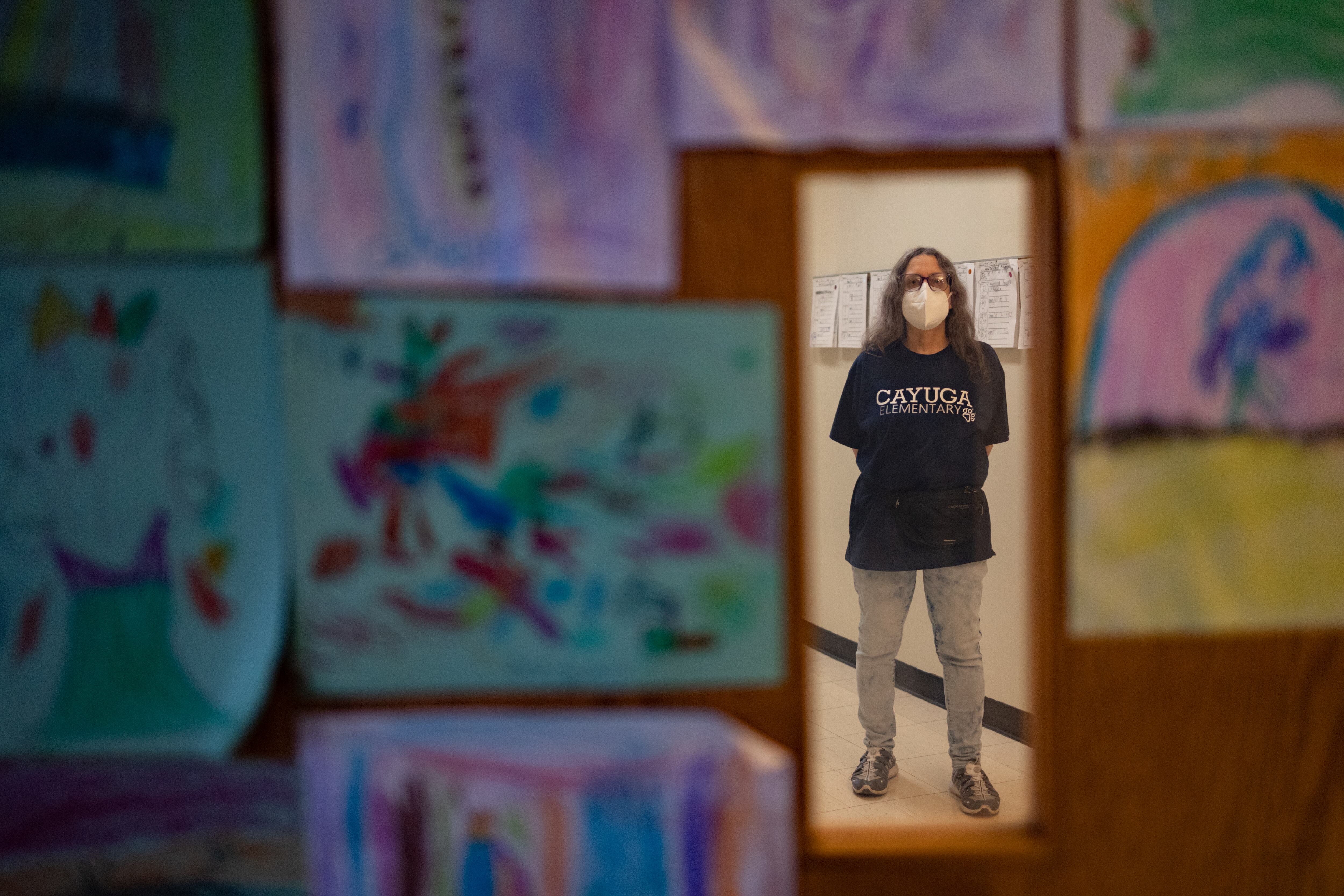Speakers at Thursday’s Philadelphia Board of Education meeting said the district’s policy requiring students and teachers to wear masks for the first 10 days of school is unwarranted, out of step with the times, and harmful to children.
School districts across the country and around the world are dropping mask mandates, the speakers noted. The share of U.S. schools requiring masks for students or teachers fell from 75% to 15% over the course of the last school year, according to the National Center for Education Statistics.
Philadelphia is requiring all students and staffers to wear masks for the first 10 school days. After that, masks will be optional except under certain circumstances, such as an increase in the COVID-19 transmission rate or the period following an extended break.
The district says any student or staffer who tests positive for COVID-19 must isolate for five days. After that, there’s a “mask-to-stay” policy that requires the person to wear a “high-quality mask” and eat in a designated area or isolate at home for 10 days.
Chief Medical Officer Kendra McDow said a typo in an earlier version of the guidelines indicated students with COVID-19 symptoms who test negative would have to stay home until they were symptom-free and diagnosed with something other than COVID. She said that in fact, students would need to be symptom free or be diagnosed with a non-COVID condition in order to return to school, not both. This error has been corrected on the district’s website, McDow said.
But masks were the focus of many of the comments about the district’s COVID protocols. Parent Robert Ziegler called the district’s mask policy “out of touch with our current reality.”
“Districts all over the world are eliminating mask mandates, and so should this one,” Ziegler said.
Others echoed that view, saying the policy might cause families to consider leaving the district for neighboring communities with no mask rules.
“Where is the absolutely necessary risk-benefit analysis?” asked parent Vincent Feldman.
Feldman said he has two children in the district and is president of the Pennsylvania chapter of Children’s Health Defense, a Robert Kennedy Jr.-led group recently suspended by Facebook and Instagram for violating community standards on misinformation.
Other speakers who protested the mandate also identified themselves as affiliated with groups opposed to some COVID protocols. They included Lynn Landes, co-founder of HealthAlertPhilly.org, and Diane Soucy, director of the Activities for Daily Living Center. Suzanne Shaheen, a parent who was featured on “Fox & Friends First,” told the board her son was “put in isolation” because he “cannot wear his mask.”
“Students with disabilities or a medical condition that prevents them from being able to wear a mask can seek accommodations,” McDow said.
Only one speaker praised the mandate. “I’m here to thank you for maintaining at least some level of COVID precautions in our schools,” parent Stephanie King told the board. “It’s a pity that COVID is so politicized that saying, ‘We should try to protect people from catching a potentially deadly illness with unknown long-term side effects,’ is seen as a radical proposition,” she said.
King told Chalkbeat she decided to speak because she had expected groups opposed to the policy would rally parents to voice their concerns. “It’s what you do in school advocacy.”
Philadelphia schools are poorly ventilated and serve families that may be at higher risk for COVID-19 complications and have less access to health care, King added. “I think these restrictions reflect the reality on the ground,” she said.
Teacher leave policy causes concern
Meanwhile, board members questioned the district’s policy on so-called “direct quarantine leave” for teachers. Each teacher is allowed 10 days of leave for COVID-19, after which sick days, personal time, and vacation days must be used. Any time off after that would be unpaid, and absences would count as “occurrences” on an employee’s record, McDow said.
“I’m just concerned it’s going to cause people to come to work sick,” said board member Mallory Fix-Lopez.
Fellow board member Cecelia Thompson agreed, saying that people shouldn’t be blamed if they contract COVID more than once despite being careful and following rules. “Sometimes these things happen,” she said.
In response, Superintendent Tony Watlington Sr. said that the school community as a whole, and not just schools themselves, is responsible for managing and mitigating COVID in the community.
However, he said, “We are sensitive to the issue of not wanting anyone to lose pay by no fault of their own.”
McDow suggested the board “get an update” on the issue as it relates to collective bargaining agreements to “help everyone decide how to proceed.”
Staffing update
School officials at the meeting also updated the board on staffing for the coming school year. The district is about 97% staffed, “about where we were when we started the school year last year,” Chief Talent Officer Larisa Shambaugh said.
Principal roles are 99% filled, as are 97.4% of teaching positions, she said. That latter figure doesn’t include teachers scheduled to be on leave, and not every teacher is assigned to a classroom, she said.
The vacancy rates for non-instructional jobs, such as building engineers are higher, but new hires are in the pipeline waiting for their paperwork to be processed, she said.
The district has made “good progress this month” on teacher hiring, Shambaugh said. More than 700 new teachers attended a five-day orientation earlier this month, and the district made more than 30 offers to potential teachers in the five days preceding the meeting, she said.
“We’re still hiring,” though vacancies remain, particularly in special education and the middle grades, she said.





